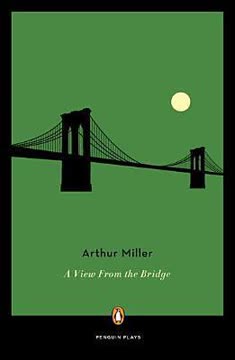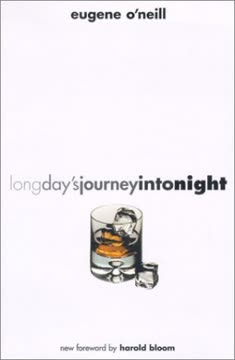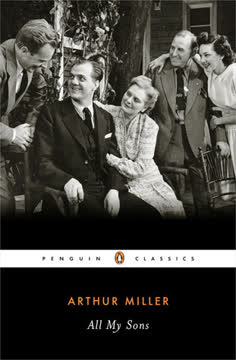Plot Summary
Brooklyn Shadows Gather
The play opens in Red Hook, Brooklyn, where the Italian-American community is bound by tradition, pride, and a code of silence. Alfieri, a lawyer and the play's narrator, introduces the world as a place where justice and law often diverge. He foreshadows the coming tragedy, hinting at the tension between American law and Italian customs. The neighborhood is a character itself, shaping the lives and destinies of those within it. The stage is set for a story of love, betrayal, and the struggle between personal desire and communal loyalty. The audience is drawn into a world where every action is scrutinized, and the consequences of breaking the unspoken rules can be devastating. The sense of impending doom lingers, as the characters' fates begin to intertwine.
Dockworker's Quiet Devotion
Eddie, a hardworking longshoreman, is fiercely devoted to his wife Beatrice and her orphaned niece, Catherine, whom he has raised as his own daughter. His love for Catherine borders on obsession, though he remains unaware of its true nature. Eddie's sense of duty and protectiveness is both his strength and his flaw. He works tirelessly to provide for his family, but his inability to articulate his feelings leads to tension and misunderstanding. The stability of his home is threatened by forces he cannot control, and his rigid adherence to traditional values blinds him to the changing dynamics within his household. Eddie's devotion, meant to protect, becomes the seed of his undoing.
Orphaned Niece Blossoms
Catherine, on the cusp of womanhood, is eager to step into the world. She looks up to Eddie, seeking his approval for every decision, from her new job offer to her choice of clothes. Her innocence is both endearing and dangerous, as she is unaware of the effect she has on Eddie. As she grows more independent, the boundaries between niece and daughter, child and woman, begin to blur. Catherine's journey is one of self-discovery, as she learns to assert her own desires and navigate the complexities of love and loyalty. Her transformation is both a source of pride and pain for those around her, setting the stage for conflict.
Beatrice's Growing Unease
Beatrice, Eddie's wife, is the emotional anchor of the household. She notices the subtle shifts in Eddie's behavior and Catherine's growing independence. Beatrice's intuition tells her that something is wrong, but she struggles to articulate her fears. Her attempts to bridge the gap between Eddie and Catherine are met with resistance, leaving her feeling isolated and powerless. Beatrice's love for her family is unwavering, but she is caught between loyalty to her husband and concern for her niece. Her growing unease foreshadows the storm to come, as she watches the family she cherishes begin to unravel.
Italian Cousins Arrive
The arrival of Beatrice's cousins, Marco and Rodolpho, illegal immigrants from Italy, brings hope and tension to the Carbone household. Marco is stoic and hardworking, determined to send money home to his starving family. Rodolpho, in contrast, is lively and charming, with dreams of making it in America. Their presence is both a blessing and a burden, as the family risks everything to shelter them. The cousins' arrival disrupts the fragile balance in the home, exposing hidden desires and resentments. The clash between old-world values and new-world aspirations becomes increasingly pronounced, setting the stage for conflict.
Bonds and Boundaries Blur
As Marco and Rodolpho settle in, the dynamics within the Carbone household shift. Catherine is drawn to Rodolpho's charisma, while Eddie's protectiveness intensifies. The boundaries between familial love and romantic attraction become dangerously blurred. Eddie's discomfort with Catherine's growing affection for Rodolpho reveals his own conflicted feelings. Beatrice, caught in the middle, tries to maintain harmony but finds herself increasingly powerless. The bonds that once held the family together begin to fray, as each member struggles to reconcile personal desires with collective responsibility. The stage is set for a confrontation that will test the limits of loyalty and love.
Rodolpho's Golden Voice
Rodolpho's singing and lighthearted spirit captivate Catherine, drawing her closer to him. His dreams of becoming an American and his unconventional talents—singing, cooking, and dancing—set him apart from the other men. Eddie views Rodolpho's flamboyance with suspicion, questioning his masculinity and intentions. The contrast between Eddie's stoic masculinity and Rodolpho's expressive nature becomes a source of tension. Catherine's admiration for Rodolpho deepens, while Eddie's jealousy grows. Rodolpho's presence challenges the traditional roles within the household, forcing each character to confront their own desires and insecurities.
Jealousy Ignites Within
Eddie's unease with Catherine and Rodolpho's relationship intensifies, manifesting as jealousy and hostility. He becomes increasingly critical of Rodolpho, accusing him of using Catherine to gain American citizenship. Eddie's inability to control his emotions leads to confrontations with Beatrice and Catherine, further isolating him. His jealousy blinds him to the happiness of those around him, and his actions become more desperate. The once-stable foundation of the family is shaken, as Eddie's internal struggle threatens to erupt into open conflict. The seeds of tragedy are sown, as love turns to possessiveness and trust gives way to suspicion.
Catherine's Awakening Heart
Catherine's feelings for Rodolpho deepen, and she begins to assert her independence from Eddie. She recognizes the unhealthy nature of Eddie's attachment and resolves to pursue her own happiness. Catherine's decision to marry Rodolpho marks a turning point, as she steps out from under Eddie's shadow. Her awakening is both liberating and painful, as she must choose between loyalty to the man who raised her and love for the man she wants to marry. Catherine's courage in following her heart sets her on a collision course with Eddie, whose inability to let go will have devastating consequences.
Betrayal at the Table
Unable to accept Catherine's choice, Eddie seeks advice from Alfieri, hoping for legal grounds to stop the marriage. When the law offers no solution, Eddie's desperation leads him to betray his own code of honor. He anonymously reports Marco and Rodolpho to immigration authorities, endangering their lives and shattering the trust within his family. The act of betrayal is a point of no return, exposing Eddie's true motivations and setting the stage for tragedy. The family is torn apart, and the community's code of silence is broken. Eddie's actions have irreversible consequences, as the cost of his obsession becomes clear.
Law and Loyalty Clash
Alfieri, the lawyer and narrator, serves as a bridge between American law and Italian tradition. He recognizes the limitations of the legal system in matters of the heart and honor. Alfieri's attempts to counsel Eddie are met with resistance, as Eddie is driven by forces beyond reason. The clash between law and loyalty is at the heart of the play, as characters struggle to reconcile personal desires with communal expectations. Alfieri's role as observer and participant highlights the complexity of justice, and his inability to prevent the tragedy underscores the limits of human intervention. The tension between individual will and collective morality comes to a head.
Marco's Silent Fury
Marco, devastated by Eddie's betrayal, is consumed by a sense of injustice. His stoic exterior gives way to righteous anger, as he confronts Eddie in front of the community. Marco's accusation is both a demand for accountability and a warning to others. The conflict between Eddie and Marco becomes a battle for honor, with the community as witness. Marco's fury is not just personal—it is a defense of the values that bind the community together. The stage is set for a final confrontation, as the forces of pride, loyalty, and vengeance collide.
Eddie's Desperate Plea
Isolated and desperate, Eddie pleads with Beatrice and the community to restore his honor. He cannot accept the loss of Catherine or the shame of his betrayal. Eddie's need for respect becomes an obsession, driving him to reckless actions. His inability to see beyond his own pain blinds him to the suffering of those around him. The plea for redemption is both tragic and futile, as Eddie's actions have already sealed his fate. The emotional intensity reaches its peak, as Eddie's world unravels and the consequences of his choices become inescapable.
The Kiss of Ruin
In a moment of desperation, Eddie kisses Catherine and Rodolpho, an act that lays bare his conflicted emotions and shatters any remaining illusions. The kiss is both a declaration and a violation, exposing the depth of Eddie's obsession and the impossibility of reconciliation. The family is left reeling, as the boundaries between love and possession, loyalty and betrayal, are irrevocably crossed. The kiss marks the point of no return, as the tragedy moves inexorably toward its climax. The emotional fallout is devastating, as the characters are forced to confront the truth of their relationships.
Marco's Accusation
Marco, now facing deportation, confronts Eddie in front of the neighborhood, accusing him of betraying his own people. The accusation is a public shaming, intended to restore honor and warn others against similar acts. The community is forced to choose sides, as the conflict between personal loyalty and communal values comes to a head. Marco's actions are both a plea for justice and an act of vengeance. The tension reaches its breaking point, as the forces of pride, shame, and retribution converge. The stage is set for the final, tragic confrontation.
Tragedy on the Street
The conflict between Eddie and Marco culminates in a violent confrontation on the street. Eddie, unable to accept his loss and humiliation, challenges Marco in a final act of defiance. The fight is brutal and swift, ending with Eddie's death. The tragedy is complete, as the consequences of pride, obsession, and betrayal are laid bare. The community is left to grapple with the aftermath, as the cost of upholding honor and tradition becomes painfully clear. The play's emotional arc reaches its devastating conclusion, leaving the audience to reflect on the nature of justice and the limits of forgiveness.
Blood and Honor Spilled
Eddie's death is both a punishment and a release, restoring a sense of order to the community. The cycle of violence and retribution is complete, but the scars remain. The characters are left to mourn their losses and reckon with the choices that led to tragedy. The themes of honor, loyalty, and the destructive power of obsession are brought into sharp relief. The play ends with a sense of inevitability, as the forces that shaped the characters' lives continue to exert their influence. The cost of upholding tradition is made painfully clear, as the community moves forward, forever changed.
Aftermath and Reflection
In the aftermath, Alfieri reflects on the events, questioning the nature of justice and the limits of the law. He acknowledges the tragedy of Eddie's fate, recognizing both his flaws and his humanity. Alfieri's final words serve as a meditation on the complexities of love, honor, and the immigrant experience. The play ends not with resolution, but with a sense of ambiguity, as the audience is left to ponder the meaning of justice and the price of loyalty. The emotional impact lingers, as the story's lessons resonate beyond the confines of the stage.
Characters
Eddie Carbone
Eddie is a longshoreman whose devotion to his family masks a deep, unacknowledged desire for his niece, Catherine. His sense of duty and honor is rooted in traditional values, but his inability to confront his own feelings leads to jealousy and betrayal. Eddie's psychological struggle is the heart of the play—he is both a victim and a perpetrator, driven by forces he cannot control. His relationships with Beatrice and Catherine are marked by love, possessiveness, and denial. Eddie's tragic flaw is his refusal to adapt, leading him to betray his own code and ultimately destroy himself. His journey is a cautionary tale about the dangers of unchecked emotion and the limits of personal responsibility.
Catherine
Catherine is a young woman on the verge of adulthood, torn between loyalty to Eddie and her love for Rodolpho. Raised by Eddie and Beatrice after her parents' death, she is initially naive and eager to please. As the play progresses, Catherine becomes more assertive, challenging Eddie's authority and pursuing her own happiness. Her relationship with Rodolpho is both a catalyst for conflict and a symbol of hope. Catherine's psychological development is marked by a growing awareness of her own desires and the courage to defy expectations. She embodies the struggle for self-determination in a world bound by tradition.
Beatrice
Beatrice is the emotional center of the Carbone household, balancing loyalty to her husband with concern for Catherine. She senses the danger in Eddie's attachment to Catherine and tries to mediate, often at the expense of her own needs. Beatrice's psychological insight and compassion make her both a victim and a voice of reason. Her relationship with Eddie is strained by his obsession, but her love for him endures. Beatrice's journey is one of quiet strength, as she navigates the shifting dynamics of her family and ultimately confronts the reality of their situation.
Rodolpho
Rodolpho is Marco's younger brother, whose charm, talent, and ambition set him apart. His relationship with Catherine is genuine, but his unconventional traits—singing, cooking, and dancing—provoke Eddie's suspicion. Rodolpho represents the possibility of a new life, unbound by the constraints of the past. His psychological resilience and optimism contrast with Eddie's rigidity. Rodolpho's presence forces the other characters to confront their own assumptions about gender, identity, and belonging. He is both a catalyst for change and a target of resentment.
Marco
Marco is a hardworking immigrant, motivated by the need to provide for his family in Italy. His loyalty to his brother and his sense of justice define his character. Marco's psychological strength lies in his ability to endure hardship and maintain his dignity. When betrayed by Eddie, Marco's anger is righteous and controlled, culminating in a demand for accountability. His relationship with Rodolpho is protective, and his conflict with Eddie is a battle for honor. Marco embodies the values of sacrifice and retribution, serving as a counterpoint to Eddie's self-destruction.
Alfieri
Alfieri is the play's narrator and a lawyer who serves as a moral compass. He observes the unfolding tragedy with a sense of inevitability, recognizing the limitations of both the law and personal intervention. Alfieri's psychological role is that of a mediator, attempting to reconcile the demands of justice with the realities of human emotion. His relationship with Eddie is one of empathy and frustration, as he tries to guide him away from disaster. Alfieri's reflections frame the narrative, inviting the audience to consider the complexities of justice, fate, and the immigrant experience.
Louis
Louis is a minor character, a friend of Eddie's who represents the broader community's adherence to tradition and the code of silence. His presence underscores the pressures faced by the main characters and the consequences of breaking communal norms. Louis's psychological role is that of an observer, reflecting the values and fears of the neighborhood. He serves as a reminder of the collective forces that shape individual destinies.
Mike
Mike, another friend and neighbor, reinforces the importance of reputation and loyalty within the community. His interactions with Eddie and the others highlight the social dynamics at play. Mike's psychological function is to embody the expectations and judgments of the group, serving as a barometer for acceptable behavior. He is a subtle but important presence, illustrating the power of collective opinion.
Immigration Officers
The immigration officers represent the external forces that threaten the Carbone family's stability. Their arrival is a turning point, exposing the vulnerability of the characters and the limits of their control. Psychologically, the officers are faceless enforcers of the law, indifferent to the personal consequences of their actions. They serve as a reminder of the broader societal forces at work, shaping the fate of individuals and families.
Mrs. Lipari
Mrs. Lipari is a neighbor whose own family is affected by the immigration crackdown. Her presence highlights the ripple effects of Eddie's betrayal and the interconnectedness of the community. Psychologically, she represents the shared vulnerability and resilience of those living on the margins. Mrs. Lipari's experiences mirror those of the main characters, reinforcing the play's themes of loyalty, sacrifice, and survival.
Plot Devices
Greek Tragedy Structure
Miller structures the play as a modern Greek tragedy, with Alfieri serving as a chorus-like narrator who frames the action and comments on its significance. The use of foreshadowing, dramatic irony, and escalating tension creates a sense of inevitability, as the audience is made aware of the coming disaster long before the characters are. The play's structure emphasizes the conflict between fate and free will, as Eddie's choices lead inexorably to his downfall. The narrative is tightly focused, with each scene building on the last, heightening the emotional stakes and driving the story toward its tragic conclusion.
Symbolism of the Bridge
The title's bridge represents both the physical connection between Brooklyn and Manhattan and the metaphorical divide between cultures, generations, and values. The bridge is a liminal space, a place of transition and uncertainty. It symbolizes the characters' attempts to navigate the gap between old-world traditions and new-world aspirations. The bridge also serves as a reminder of the precariousness of their situation, suspended between safety and danger, belonging and exile.
Code of Silence (Omertà)
The Italian-American code of silence, or omertà, is a central plot device, shaping the characters' actions and the community's response to betrayal. The fear of exposure and the need to protect one's own create a climate of secrecy and suspicion. The breaking of this code by Eddie is the catalyst for the play's tragedy, highlighting the tension between personal desire and collective responsibility.
Foreshadowing and Irony
Miller employs foreshadowing through Alfieri's narration and the characters' dialogue, creating a sense of impending doom. Dramatic irony is used to heighten the emotional impact, as the audience is aware of the consequences of Eddie's actions before he is. The interplay of fate and choice is underscored by these devices, reinforcing the tragic structure of the play.
Analysis
Arthur Miller's "A View from the Bridge" remains a powerful exploration of the immigrant experience, the limits of justice, and the destructive power of obsession. The play's modern relevance lies in its examination of the tensions between personal desire and communal loyalty, as well as the challenges of navigating cultural identity in a changing world. Miller's use of Greek tragedy structure and symbolism elevates the story, inviting audiences to reflect on the nature of fate, honor, and the human need for belonging. The characters' psychological complexity and the play's unflinching portrayal of moral ambiguity make it a timeless meditation on the costs of upholding tradition at the expense of personal happiness. Ultimately, the play serves as a cautionary tale about the dangers of unchecked emotion and the importance of empathy, understanding, and adaptation in the face of change.
Last updated:
Review Summary
A View from the Bridge receives mixed reviews, with praise for its powerful exploration of human emotions, family dynamics, and societal issues. Readers appreciate Miller's nuanced characters and the play's tragic elements. Some find the themes of jealousy, immigration, and masculinity compelling, while others are disturbed by the incestuous undertones. The play's setting in 1950s Brooklyn and its examination of the American Dream resonate with many. Critics commend Miller's writing style and the play's ability to provoke thought and discussion about moral dilemmas and human nature.
Similar Books
Download PDF
Download EPUB
.epub digital book format is ideal for reading ebooks on phones, tablets, and e-readers.











